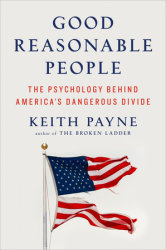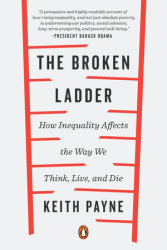Americans believe strongly in personal responsibility. It’s one of the underpinnings of our culture—and of all of Western thought—and rightly so. But Americans also believe deeply in fairness, and it’s increasingly difficult to square either of these American values with the dramatic rise in income inequality that this country has witnessed over the last fifty years.
According to nonpartisan policy and research institute the Center on Budget and Policy Priorities, since the 1970s, income growth for high-earning households has vastly outpaced that of low- and middle-earning households. Over the last ten years, the wealthiest one percent of households’ share of before-tax income “has climbed to levels not seen since the 1920s.” And when it comes to households’ wealth—the value of assets minus debts—the top three percent possess more than half of all wealth in the United States.
Keith Payne tackles inequality and its wide-ranging effects in his timely and illuminating new book, The Broken Ladder: How Inequality Affects the Way We Think, Live, and Die. In America and all over the world, more inequality correlates to more health and social problems. It influences how we think about social justice, how we vote, how we save for retirement or don’t, what illnesses are likely to afflict us, and how long we can expect to live. But inequality is about more than just the amount of money in a person’s bank account. “Inequality is not the same as poverty,” Payne writes. “Inequality makes people feel poor and act poor, even when they’re not. Inequality so mimics poverty in our minds that the United States of America, the richest and most unequal of countries, has a lot of features that better resemble a developing nation than a superpower.”
Payne recently spoke with Penguin Random House about how inequality permeates our perception of ourselves and others, the role of fundamental attribution error and how it reinforces the notion of poverty as a result of personal failings, and what we can do to feel more at ease in our own skin.
PENGUIN RANDOM HOUSE:You punctuate this book with stories from your own life, like how, when you were in the fourth grade, a new lunch lady asked you to pay for your lunch, not knowing you received free lunches. How did your personal experiences inform your career path and your decision to write this book?
KEITH PAYNE: My personal experiences with poverty and wealth, with high status and low status, have been so incongruous and startling to me that it drove home how far apart people’s subjective experiences of poverty and their actual income can be. And when I looked at the new psychology research, I realized that it was often the subjective experiences that matter most. For example, in the fourth grade lunch line, when I first realized that my free lunches meant I was poorer than other kids, my world suddenly changed. My family’s income was the same, but now I felt poor, and started seeing the world and acting accordingly.
It was a huge demotion, psychologically. Later when I went to college and graduate school, the opposite happened. I had no money but felt upper class because I was on a trajectory that made me feel confident for the first time in my life that things would go my way. I felt that disconnection again when I began my first position as a professor. At 27 years old I went from being a poor graduate student one day to being called “professor” by everyone and treated with more respect than I had ever experienced. These incongruous experiences made me aware of the profound disconnections between people’s objective incomes and their subjective experiences of it. And that disconnection is the linchpin that psychologically connects inequality (the size of the gap between rich and poor) to poverty. When inequality gets very high as it is today, everyone feels poorer. Even the middle class feels left behind.
PRH:If you regard yourself as poor, regardless of your actual income, what are some things that are more likely to happen to you?
PAYNE: Subjective feelings of wealth and poverty are associated with a huge range of health and emotional problems. Holding constant people’s actual incomes, those who feel poorer are more likely to suffer from depression and anxiety disorders, cardiovascular disease, and obesity and diabetes. The cumulative effect of all these illnesses is that people who feel poorer actually have shorter life expectancies. I saw this dynamic in one study that my colleagues and I conducted with cancer survivors.
This group of survivors had undergone a kind of stem-cell therapy that is brutal to experience. A high rate of patients who survive the treatment experience post-traumatic stress disorder from the treatment itself. We measured their quality of life (including PTSD, anxiety, and depression) six months after the treatment. Their objective incomes didn’t predict their quality of life, but those who felt poorer were more likely to develop PTSD as well as to suffer from depression and anxiety in the following months. The interesting thing about this study is that the stem cell therapy is expensive and cutting edge, and not generally covered by insurance. That means that patients in our study were all relatively wealthy. And even among this wealthy group, feeling poor predicted poor outcomes.
PRH:One of the most striking themes of your book is just how inaccurately people see themselves, especially regarding where they stand on what you call the “status ladder.” In your research or elsewhere, have you had occasion to show people where they actually fall on the ladder, and if so, how have they responded when confronted with the truth?
PAYNE: This question of where people “really stand” on the status ladder is interesting, and tricky. When we ask people to rate themselves on the status ladder, we ask them to consider things like their income, education, and jobs, and rate where they stand compared to other people. If you feel that you are better off than most people, you can probably find an angle that justifies that feeling. Maybe it’s focusing on your education and ignoring the income part.
Or maybe it’s selectively picking the “other people” you compare to. Likewise, if you feel worse off than others, you can probably focus on one or two aspects of the comparison to justify it. The important part—for predicting people’s behavior and their thoughts—is their subjective experience. And if someone feels above or below average, providing them facts about income distributions does not change much.
PRH:What is fundamental attribution error and how does it affect our ideas about inequality?
PAYNE: Imagine that you see Mary weeping. It might be because of something about Mary (is she a depressive personality?) or it might be something about the situation she’s in (maybe she has just been dumped?). The fundamental attribution error is the widespread bias to think about person-based explanations and ignore situation-based explanations.
When it comes to unequal economic outcomes, this means that we look at successful people and assume it’s because of their hard work and talent, and we look at unsuccessful people and assume they are lazy or dumb. We ignore situational factors—like whether they were raised by wealthy or poor parents, attended good or bad schools, or had opportunities in their lives.
Both can matter, but the data show that by far the best predictor of how much people will achieve in terms of income and education is the income and education of their parents and the geographical locations in which they were born. And yet, many people can’t help seeing millionaires as brilliant, and food stamp recipients as deficient.
PRH:In Chapter Two, about why we can’t stop comparing ourselves to others, you write that inequality is hard to see because “its essence is the lack of a single shared experience.” Essentially, “the haves and the have-nots separate themselves from one another where they live, where they work, and where they go to school.” What is this segregation doing to how people perceive one another and the world?
PAYNE: The increasing residential and social segregation that is happening today changes what people think of as “normal.” If you live in a wealthy suburb of Washington DC, you may think that it is completely normal to drive an Audi, and spend a thousand dollars a month on restaurants, and it would be very strange if your friend’s child did not go to a four-year college.
But if you live in a trailer park in rural Kentucky, you might think it’s totally ordinary that the neighbor’s teenager sells drugs and that no one you know has gone to college. People do what seems normal to them. Segregation creates increasingly different norms for what regular people do, and that has the effect of reinforcing inequality.
PRH: In exploring how inequality divides our politics, you debunk the notion that poor people tend to vote conservative and rich people tend to vote liberal. But in the 2016 presidential election, we heard a lot about working class people who voted for Donald Trump. To what extent was voting in this election in line or out of line with historical trends, and what can we learn from it?
PAYNE: The journalistic coverage of the 2016 election fell prey to the same bias as was observed in the previous several elections—depicting poor people voting mainly Republican and wealthy people voting mainly Democrat. In fact, higher income was associated with a greater likelihood of voting for Donald Trump in 2016.
The typical Trump voter earned above the national average income, and the typical Clinton voter earned below the national average. The misperception arises because, although richer individuals tend to vote Republican, the average person in richer states tends to vote Democrat. I think that the resolution to this puzzle is found in the fact that people vote not based on their objective income but on their subjective experiences of the status ladder. The more money you make, the higher you will tend to feel on the status ladder. That means that conservative policies like tax cuts will probably sound like they are in your interest, even though most people who feel subjectively rich would not actually benefit from tax cuts that help the top tax brackets.
Conversely, the poorer you feel, the more it will feel in your interest to strengthen the social safety net. But here’s the surprising thing: the poorer the state you live in, the richer you are likely to feel. Imagine two people who earn $58,000 a year (about the national average household income). One who lives in Alabama will feel much richer than one who lives in Connecticut. So if people vote based on their subjective perceptions—what feels in their self-interest—rather than economic realities, it explains both why richer people vote Republican and people in poorer states vote Republican. From the liberal perspective this looks like poor people voting against their self-interest. But if you ask those people what they see as their self-interest, they will tell you they are voting rationally.
PRH:Thomas Jefferson has often been credited with saying, “An educated citizenry is a vital requisite for our survival as a free people.” But these days, it seems like the populace, at least in the U.S., is woefully uninformed. For example, you describe a survey that showed that 40% of people who had received government benefits did not believe they had. If the public is that ignorant of the facts, how can we hope for legislation and change that will actually benefit most people?
PAYNE: When the stimulus package was passed in the wake of the 2009 financial crisis, the government did something savvy: projects funded by the stimulus carried big signs that said, in effect, “This project is brought to you by the American Recovery and Reinvestment Act.” You would see those signs at road construction sites and bridge repairs, for example. Political scientists have a term—the submerged state—for the fact that many government programs that help people are invisible. We don’t see tax breaks, Medicare, or government subsidies for policies like Obamacare or social security on a day-to-day basis. I think those policies should carry signs—like the ones on construction sites—that let you know that you are getting a break because of a particular policy. For example, tax forms could say, “Here is what you owe based on your income. But here is what you actually pay because of the Earned Income Tax Credit.”
PRH: In your chapter about how inequality is a matter of life and death, you write about something that’s been in the news a lot lately: in the U.S., death rates have been steadily declining, with the exception of middle-aged whites, especially those without a college degree. I was especially struck by the line, “This demographic group is dying of violated expectations.” Can you describe these deaths of despair and explain what you mean by that sentence?
PAYNE: The group for whom death rates are alarmingly increasing—middle-aged whites without a college degree—is a great example of how subjective experiences of the status ladder can peel apart from objective wealth. This group has been hit hard by increasing automation, just like low-education black and Hispanic Americans. But black and Hispanic death rates continue to trend down. What separates the groups is that whites expected, based on their past experiences and their parents’ generation, to do better. By comparison to those expectations they feel left behind. That’s why it is interesting that the causes of death driving this increase are largely self-inflicted wounds like drug overdoses and suicides.
PRH:Your chapter about racial and economic inequality is full of sobering research about implicit bias around race, like how many people view black welfare recipients as lazy and dishonest and white ones as the “deserving poor,” and how blacks receive more severe criminal sentences. But you remain optimistic. You conclude that section by saying, “Consider this chapter an invitation to look forward.” Can you elaborate?
PAYNE: The living conditions of black and white Americans really are staggeringly different. But the perceptions of these groups are also in different worlds. Black Americans believe that racial discrimination against blacks is widespread, but whites see racial discrimination as largely a thing of the past. Psychologists Richard Eibach and Joyce Ehrlinger discovered that those perceptions are driven by different reference points. If you ask how bad racial prejudice is today, white Americans tend to think about the Jim Crow past. By comparison to that, today seems pretty good. But when you ask black Americans the same question, they think of what true equality would look like. By comparison to that ideal future, today seems woefully prejudiced. These researchers found that if you first get each group to consider the other group’s reference point, their differences of opinion about the present largely disappear. What I’m trying to do in this chapter is encourage white Americans to think about what a truly equal America would look like. By comparison to that, I think most readers will agree we have work to do.
PRH:At the end of the book, you write that big-picture economic change is a long-term prospect, but suggest that we might “improve the quality of individual lives on a more immediate basis”—for example, by recognizing when we are compulsively comparing ourselves to others and consciously choosing comparisons that are relevant and useful, redirecting our comparisons from other people to our own pasts, and assessing what is most meaningful to us. Can you explain how changing one’s perspective can help people live better despite the realities of inequality?
PAYNE: The best solution to the problems we’ve been discussing is to reduce economic inequality and widen the ability of ordinary people to share in the historic increases in wealth that America has been experiencing for the past half century. But in the short term, I outline a number of psychological strategies that people can use, for themselves and their children, to get off the treadmill of constant social comparison. We discussed that importance of subjective experiences—how much it matters if we feel poor, regardless of actual income.
By making social comparisons strategically and purposefully rather than as a knee-jerk reaction, we can take control of how we feel compared to others. So when we need inspiration or motivation, it makes sense to compare ourselves to those more successful than us. It may make us feel inferior, but it can also give us an energy boost. And when the problem is that we are feeling stressed or left behind, then it makes sense to compare to those who are not as far ahead as we are. It might encourage us to rest on laurels, but downward comparison can give us some much-needed breathing room on the status ladder.
All of these comparisons, however, are really indirect ways of reassuring ourselves that we are good, valuable people worthy of respect and admiration. The best strategy is to go straight to the heart of the matter: spend some time reflecting on what really matters to you. This simple activity, which can be done on a moment’s notice and on a daily basis, gives us the best of both worlds. It motivates us to pursue the things that really matter, ignore the things that don’t, and to feel comfortable in our own skin regardless of what those around us may have.












